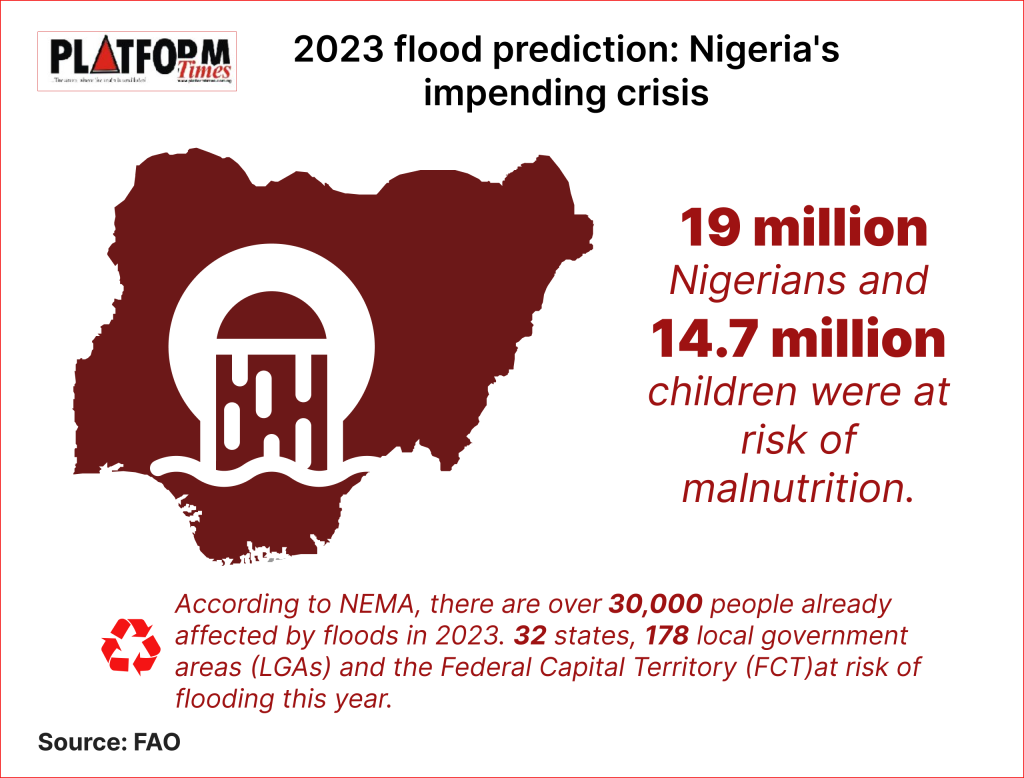Daud Olatunji
Access to potable drinking water might become challenging in the coming weeks as there are predictions that Nigeria will experience another flood this year.
The National Emergency Management Agency had also received a notification from the Cameroonian government on the gradual opening of the Lagdo Dam in Northern Cameroon which links to Nigeria’s River Benue.
By this, excessive flood water can contaminate private water sources like boreholes, wells and springs. UNICEF data says that only 30 per cent of Nigeria has access to free water contaminants. This means 70 per cent of the population, more than 150 million Nigerians, consumes contaminated water.
Aside from climate change playing a significant role in increasing rainfall that exacerbates flooding, Nigeria’s infrastructural negligence also contributes a first-hand challenge to flooding. As this continues to linger, Nigerians face the losses.
Last year, floodwater flowed into more than 25 states, displaced 1.4 million residents from their homes and killed more than 600 people. It also affected over 390,000 heaters of land and destroyed over 176,000 farmlands.
NEMA, which had earlier this year enlisted 32 states, 178 local government areas (LGAs) and the Federal Capital Territory (FCT)at risk of flooding. These developing crises would place the country at a disadvantage in actualizing the 2030 Sustainable Development Goals; water access being one of them.
UNICEF data says that most of the water accessed at the basic level is unsafe for drinking despite an improvement in accessibility to water from 2015 to 2022.
By breakdown, it means that 3 out of 10 Nigerians can access safely managed water daily. However, with the flood incidents, the numbers might increase. By implication, contaminated water would also increase high chances of diseases like
cholera, malaria, diarrhoeal, typhoid and other water-borne related illnesses
Nigeria experiences seasonal flooding, but in the last decade, the country has reported two flood incidents in 2021 and 2022. In some riverine communities or coastal regions, the flood occurs almost annually. However, the losses, beyond water contamination, endangers the health, economic, and agricultural system.
Last year, an estimate of N4.2 trillion (translating to $9.12 billion at an official exchange rate of N460.78/$) economic investment was lost to the flooding. Furthermore, the Ministry of Humanitarian Affairs said that as of November 25, 2022, an electrical project of around $1.2 billion was (expectedly) damaged.
Additionally, N700 billion in agricultural investment was also reportedly lost by the flood, while the inflation rate between September and November consistently increased from 20.77 per cent to 21.09 per cent and 21.47 per cent.
What becomes of 2023
Already, there are over 30,000 people affected by floods in more than six states. Hundreds of houses have been submerged in incidents in Benue, Abuja, Ekiti and some coastal regions around the southern states.
There have been reports of the impact of policies (removal of fuel subsidy and unification of exchange rate) by President Tinubu on Nigeria’s economy, as prices of food and transportation worsen daily. The impact of this has consistently increased the inflation rate, peaking at 24.08 per cent- the highest in more than a decade.
The impact of the flood, if predictions are fulfilled, might worsen the economy even more and increase the inflation figures. The United Nations Food and Agriculture Organization and World Food Programme have said that the country faces a high risk
of catastrophic hunger levels. According to the FAO indication, 19 million Nigerians and 14.7 million children were at risk of malnutrition. Also, three major Nigeria’s reservoirs (Kainji, Jebba and Shiroro) would overflow, if the rainfall continues. Furthermore, more Small and Medium Scale Enterprises are at risk of losing profits.
More farmers in Benue state are expected to recount more losses due to the gradual re-opening of the Lagdo Dam.
A recent Gross Domestic Product report by the National Bureau of Statistics saw crop production and trade contributing more than 36 per cent to Nigeria’s real GDP in the second quarter of 2023. However, last year, during the flooding, the Real GDP of agriculture barely rose by 0.71 per cent between Q2 2022 and Q3 2022.
The impact of the flood affected the GDP growth in Fishing, Livestock and Forestry. There was also a drop in Trade GDP from 5.08 per cent in Q3 to 4.54 per in Q4 2022.
While there are plans by NEMA to manage the impending crisis, the impact might deepen on Nigeria’s economy especially with the target of the president to raise the country’s GDP to six per cent annually and 13 per cent in three years.
Do you want to share a story with us? Do you want to advertise with us? Do you need publicity for a product, service, or event? Contact us on WhatsApp +2348183319097 Email: platformtimes@gmail.com
We are committed to impactful investigative journalism for human interest and social justice. Your donation will help us tell more stories. Kindly donate any amount HERE




